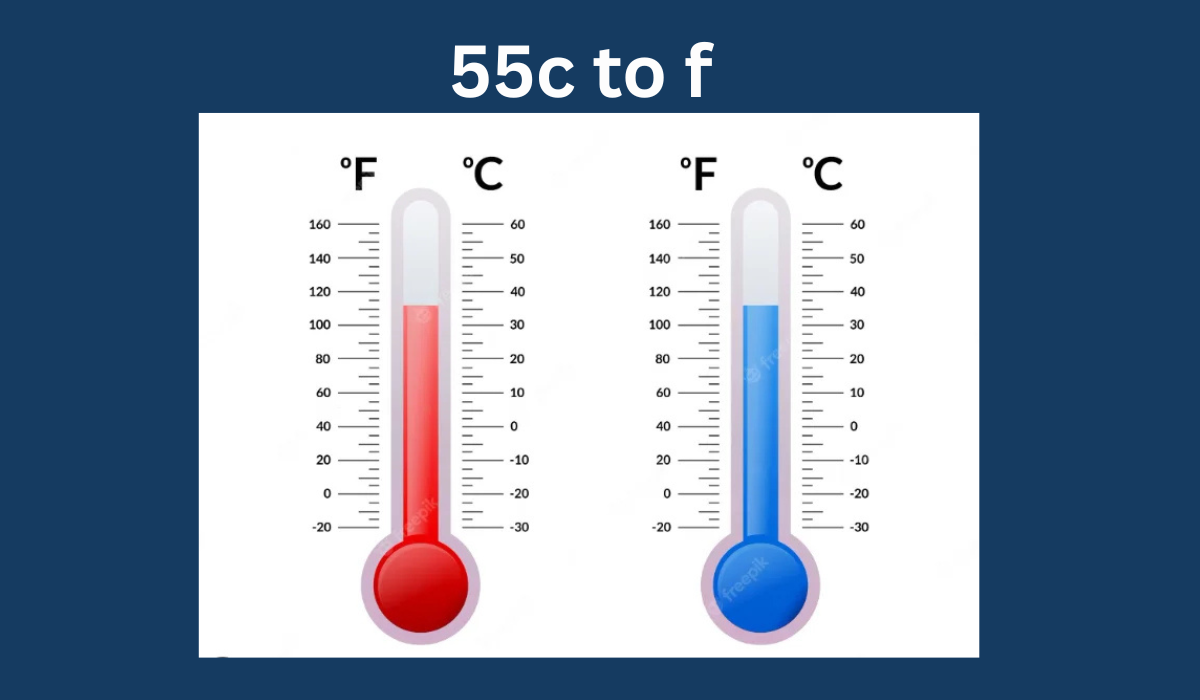Temperature conversions are an everyday necessity, whether you’re reading a recipe, traveling abroad, or conducting a scientific experiment. While countries like the United States prominently use the Fahrenheit scale, most of the world operates on Celsius. If you’ve ever wondered how to convert Celsius to Fahrenheit, particularly 55°C, you’ve come to the right place.
This guide will walk you through the conversion process, provide real-world examples of when such conversions are useful, and point out common pitfalls to avoid. By the end of this blog, you’ll not only know how to convert 55°C to Fahrenheit but also have a deeper understanding of the importance of accurate conversions.
Celsius vs. Fahrenheit: Understanding Temperature Scales
Before jumping into the formula and actual calculation, it’s important to understand the two scales:
Celsius (°C)
The Celsius scale, named after Swedish astronomer Anders Celsius, is a metric system used by most of the world. Its structure is simple:
- Water freezes at 0°C.
- Water boils at 100°C under standard atmospheric conditions.
This makes Celsius highly intuitive, especially in scientific and everyday contexts.
Fahrenheit (°F)
Fahrenheit, introduced by Daniel Gabriel Fahrenheit in the early 18th century, is primarily used in the United States and a few other countries. On this scale:
- Water freezes at 32°F.
- Water boils at 212°F.
It’s not as linear or intuitive as Celsius, which often makes conversions necessary.
Understanding the difference between these two scales is essential for accurate conversions. Now, let’s move on to the actual method of converting Celsius to Fahrenheit.
The Formula for Converting Celsius to Fahrenheit
The formula for converting a temperature from Celsius to Fahrenheit is as follows:
Fahrenheit (°F) = Celsius (°C) × (9/5) + 32
Within this formula:
- Multiply the Celsius value by 9/5 (or 1.8).
- Add 32 to the result to factor in the difference between the starting points of the two scales.
By applying this formula, you can convert any Celsius temperature to Fahrenheit with ease.
Step-by-Step Guide to Convert 55°C to Fahrenheit
Now, let’s apply the formula to convert 55°C to Fahrenheit. Follow these straightforward steps:
- Start with the formula:
\[
°F = °C × \left(\frac{9}{5}\right) + 32
\]
- Plug in the Celsius value:
Here, °C = 55. Substituting it into the formula gives:
\[
°F = 55 × \left(\frac{9}{5}\right) + 32
\]
- Perform the multiplication:
Multiply 55 by \( \frac{9}{5} \) (or 1.8):
\[
55 × 1.8 = 99
\]
- Add 32 to the result:
Add 32 to 99:
\[
99 + 32 = 131
\]
Therefore, 55°C is equal to 131°F.
Real-World Applications of Temperature Conversion
You might wonder where and when you’d need to convert 55°C to Fahrenheit. Here are a few examples:
1. Traveling Abroad
If you’re visiting a country with a different temperature scale, knowing how to convert between Celsius and Fahrenheit can help you understand local weather forecasts. For instance, 55°C would signify extreme heat in locations like deserts.
2. Cooking and Baking
Many cooking appliances and recipes use Fahrenheit in the U.S. If a recipe indicates 55°C, converting it to Fahrenheit (131°F) ensures accurate temperature settings.
3. Science Experiments
Laboratory equipment often operates on a specific temperature scale. Understanding conversions helps ensure exact conditions during experiments, such as maintaining a controlled environment at 55°C.
Common Mistakes to Avoid When Converting Temperatures
Even though the formula for converting temperatures is straightforward, a few mistakes can lead to incorrect results. Here are the most common errors to avoid:
1. Omitting Parentheses
When multiplying by \( \frac{9}{5} \), ensure that you complete this step before adding 32. Forgetting this order of operations can skew results.
2. Using Incorrect Multipliers
The conversion factor \( \frac{9}{5} \) is specific to temperature scales and should not be confused with other fractions or ratios. Double-check your calculations!
3. Skipping Units
Always label your results with the correct units (°C or °F). Mislabeling your result can lead to big misunderstandings, especially in professional settings.
Pay close attention to these details to ensure reliable conversions.
Accurate Temperature Conversions Made Simple
Knowing how to convert temperatures between Celsius and Fahrenheit is a valuable skill, whether you’re reading a thermometer, drafting a technical report, or simply curious about global weather patterns.
To recap:
- 55°C is equivalent to 131°F.
- Use the formula \( °F = °C × \frac{9}{5} + 32 \) for precise conversions.
- Avoid common mistakes like misapplying the formula or skipping steps.
For more practice or to check your calculations instantly, explore online temperature conversion tools or apps that simplify the process.
Looking to deepen your understanding of related scientific concepts? Explore our additional resources on temperature and physics to stay ahead!
You May Also Like:





